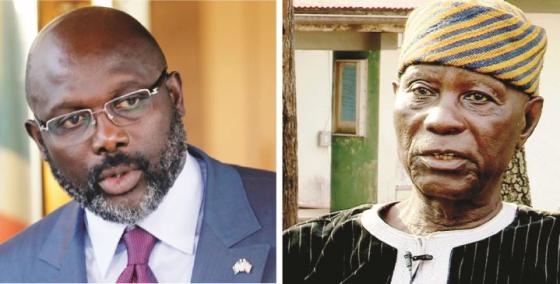Liberia: Weah Administration Silent on Dr. Guannu’s Death

Pres. Weah (left) and Joseph Guannu
.... In time past, Weah has been swift to respond to the deaths of other statesmen — issuing a public condolence message — but has not done so in the case of the renowned historian's death.
The administration of President George Weah is yet to acknowledge the death of Dr. Joseph Saye Guannu, or even issue the bereaved family a message of condolence, despite the late statesman's crucial role as former Ambassador to the United States of America and former Minister of State for Presidential Affairs during the erstwhile Interim Government of National Unity (IGNU).
Guannu, one of Liberia’s leading historians, died on August 29, at about 8:43 p.m. in Ganta City, Nimba after a protracted period of illness. A new octogenarian, Dr. Guannu was just a few weeks shy of his 82nd birthday.
In time past, Weah has been swift to respond to the death of other statesmen — issuing public condolence messages — and recounting their contributions to the state and the pains that come along with their death.
But this has not been the case in Guannu's death, one of the country’s greatest and most politically respected historians, who was widely sought after for his insights on Liberian history.
A check on the President's personal Facebook page, or that of the Executive Mansion, contains not a single word on Guannu’s death, but rather the President’s stunning reply to his political opponent, Alexander Cummings' open letter. The reply was posted on August 30, the last post on the page.
The next is a May 23 statement of condolence message to the family and people of the United Arab Emirates, regarding the death of their President Sheikh Khalifa bin Zayed Al Nahyan.
A check on the Executive Mansion page revealed nothing regarding the death of Guannu even though books by the deceased on Liberian history have been the prescribed historical texts books for Liberian schools for decades.
The Executive Mansion's most recent post, which was made on Aug. 31, is about a video of Weah delivering his Convocation Speech at the 18th Commencement Convocation of the United Methodist University in Doemah's Town, Margibi County. The Convocation happened on Aug. 30 and on that, the first post that was made on the page was Weah's reply to Cummings letter and followed by the full text of his convocation speech.
Similarly, the Ministries of Education, Information (MICAT), and Foreign Affairs are yet to make any posts on the website or Facebook about Guannu's death. The Ministry of Foreign Affairs, according to the family of the deceased, has been officially informed about the death since Aug. 31 but has yet to respond.
“President Weah did not visit Dr. Guannu when the Cabinet came to Nimba as part of his county tour earlier this year. The President even visited Sanninquelle for an hour but did not stop by to speak to the ailing Liberian statesman,” the family told the Daily Observer. “Dr. Guannu was visited mostly by close friends and some students from Cuttington University. The University of Liberia visited him while he was still alive.”
The family has also disclosed that no one from the Government of Liberia (in an official capacity) has reached out to them with a condolence message, despite tributes coming in from other Liberians and the United States Embassy near Monrovia. The US government, the family said, has phoned in through its embassy to express its condolence, likewise some of his friends.
Born on September 17, 1940, Guannu was a Liberian academic, diplomat, and historian. One of his surviving legacies is the founding of the Institute for Peace and Conflict Resolution at Cuttington University.
His writings made him a national treasure and brought history to life for perhaps millions of readers. He dedicated most of his life to trying to share his passion for history with the general public. He saw himself as an everyman blessed with lifelong curiosity and the chance to take on the subjects he cared most about.
During his lifetime, he authored several books, most notable of which are Liberia History before 1857, Liberian History up to 1847, and The inaugural addresses of the Presidents of Liberia from Joseph Jenkins Roberts to William Richard Tolbert Jr. (1848 -1976).
Others include An Introduction to Liberian government: The first Republic and the People’s Redemption Council from 1983-1985, Liberian Civics 2004-2010; and The Perennial Problems of Liberian History 1989, and Nation-states and challenges of regional integration in West Africa, among other captivating and educative writings.
Guannu was a strong voice for understanding the importance of both Liberia’s settler and indigenous histories, in efforts toward reconciliation. But before his passing, he had been out of public sight, livingly quietly in his home city of Sanninquelle with his grandson as a caregiver.
He was bedridden and confined to a wheelchair at his home in Sanniquellie. The illness, which he had been battling for a very long period, forced him to halt all of his writing projects, one of which was History of the Origin of Nimba, according to his grandson.
Beyond academia, Guannu was known for writing several deeply researched and popular works about history, diplomacy, and statesmanship. And by writing several books that are still in use as textbooks today and correcting numerous historical inaccuracies, he distinguished himself among Liberian historians.
Meanwhile, the family has told the Daily Observer that Cuttington University, where Guannu taught for years, is also yet to call the family and express its condolences. The university has also not made any posts about the deceased professor’s death on its Facebook or website.
Posts on the University's Facebook page are regarding academic activities. The most recent post, which was made on Sept. 1, regards a one-day faculty development workshop at its Junior College in Kakata, Margibi County.
